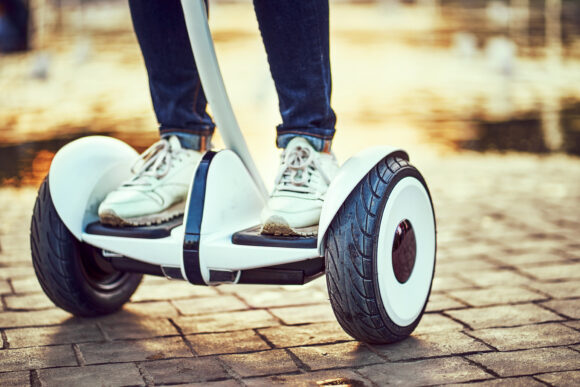David Goyco says he was like a bicyclist when he was injured while riding his low-speed electric scooter and hit by a car. Thus, he contends, he is entitled to personal injury protection (PIP) benefits from his auto insurer, Progressive Insurance Co., under a New Jersey state law that treats bicyclists like pedestrians.
However, Progressive and New Jersey courts, thus far, disagree with him. They say he was not a bicyclist or pedestrian as defined in state law while riding his scooter and thus is not eligible for the insurance benefits. However, the state’s high court has agreed to hear his latest appeal.
In November 2021, Goyco was operating a Segway Ninebot KickScooter Max when he was struck by an automobile. As a result of the accident, he sustained injuries and incurred medical expenses for his treatments. He filed for PIP benefits.
Under New Jersey law a “low-speed electric scooter” means a scooter with a floorboard that can be stood upon by the operator, with handlebars, and an electric motor that is capable of propelling the device with or without human propulsion at a maximum speed of less than 19 miles per hour. His Segway has a maximum speed of 15 mph.
Under New Jersey law, every standard automobile liability insurance policy offers no-fault PIP benefits for bodily injury as a result of an accident “while occupying, entering into, alighting from or using an automobile, or as a pedestrian, caused by an automobile.”
Progressive denied his claim, informing him he is ineligible for PIP benefits because no-fault benefits are only available if the accident involves a qualifying automobile and the Segway does not meet the definition of a qualifying automobile under the New Jersey law.
Progressive also explained that the Segway he was riding at the time of the accident disqualifies him from meeting the definition of a pedestrian as “pedestrian” is defined as “any person who is not occupying, entering into, or alighting from a vehicle propelled by other than muscular power and designed primarily for use on highways, rails and tracks.”
Goyco protested that denial but neither the trial court nor the state appeals court adopted his reasoning. Last week the state Supreme Court agreed to hear his final appeal.
Pedestrians
Goyco argues that New Jersey law recognizes bicyclists as pedestrians for purpose of no-fault coverage. He maintained that, by extension, a low-speed electric scooter like his Segway should be considered the equivalent of a bicycle under the law that states that most laws and regulations that apply to bicycles should apply to low-speed scooters, “except those provisions which by their very nature may have no application to low-speed electric bicycles or low-speed electric scooters.”
A trial court found Goyco’s reasoning “misplaced” because the law on low speed scooters is not a part of the no-fault statute and is not controlling. The no-fault insurance statute contains zero reference to “bicycles,” and defines what constitutes a “pedestrian” for purposes of the no-fault benefits. The law clearly excludes from the definition of a pedestrian “any person who is not occupying, entering into, or alighting from a vehicle propelled by other than muscular power and designed primarily for use on highways, rails and tracks.”
The judge said “muscular power’ is the operative phrase in this statute. Goyco’s Segway was not muscular powered thus does not meet the requirements of the statute. “If the Legislature intended to amend the statute to include low-powered bicycles and scooters they would have done so,” the judge wrote in denying PIP benefits.
Goyco appealed but the appellate division of the Superior Court agreed with the trial judge. The case is now before the state’s highest court, which has agreed to address the question whether someone operating a low-speed electric scooter at the time of an accident is a “pedestrian” and therefore entitled to PIP benefits.
Was this article valuable?
Here are more articles you may enjoy.


 Uber Jury Awards $8.5 Million Damages in Sexual Assault Case
Uber Jury Awards $8.5 Million Damages in Sexual Assault Case  UBS Top Executives to Appear at Senate Hearing on Credit Suisse Nazi Accounts
UBS Top Executives to Appear at Senate Hearing on Credit Suisse Nazi Accounts  China Bans Hidden Car Door Handles in World-First Safety Policy
China Bans Hidden Car Door Handles in World-First Safety Policy  Navigators Can’t Parse ‘Additional Insured’ Policy Wording in Georgia Explosion Case
Navigators Can’t Parse ‘Additional Insured’ Policy Wording in Georgia Explosion Case 